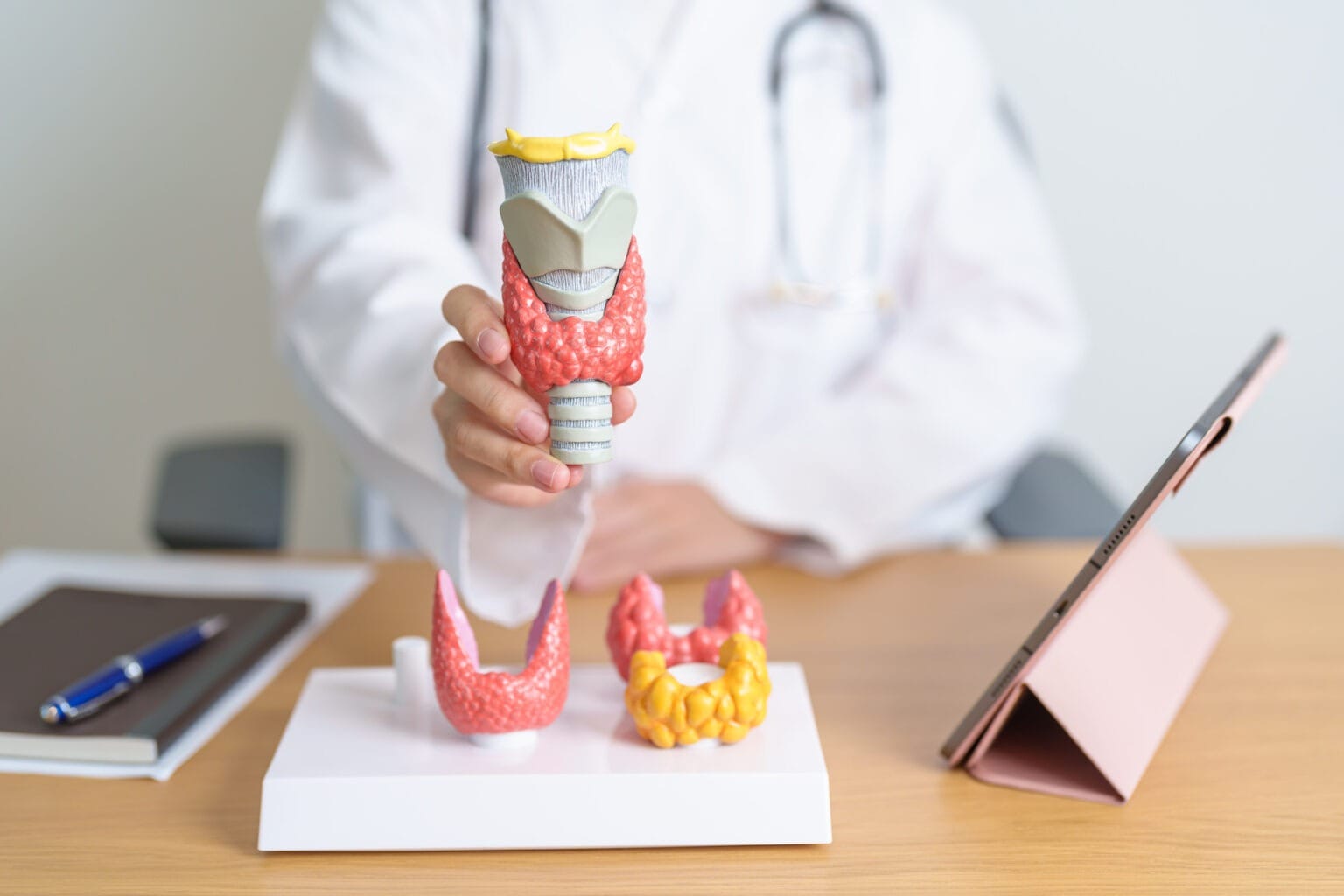Hashimoto’s thyroiditis is an autoimmune disorder that affects the thyroid gland. Most cases of Hashimoto’s are unnecessarily treated as hypothyroidism by looking at high TSH levels. While conventional medicine typically focuses on supplementing thyroid hormones, functional medicine offers a more integrated approach. This method delves into the root causes behind the autoimmune process, emphasizing personalized care through advanced diagnostic testing, tailored supplements, and dietary adjustments.
Understanding Hashimoto’s and the Functional Medicine Approach
Hashimoto’s occurs when the immune system attacks the thyroid, causing inflammation and dysfunction. Symptoms like fatigue, weight gain, hair thinning, and mental fog can take a significant toll on daily life.
Functional medicine goes beyond treating symptoms by exploring the unique factors contributing to the condition. It seeks to identify potential triggers, such as nutrient deficiencies, chronic stress, or environmental influences, and address them to restore balance and support overall health.
Essential Testing for Hashimoto’s
Functional medicine prioritizes in-depth diagnostic tests to uncover underlying imbalances that drive Hashimoto’s. Key assessments include:
1. Comprehensive Thyroid Testing: Measuring TSH, Free T3, Free T4, Reverse T3, and thyroid antibodies (TPOAb and TgAb) provides a complete picture of thyroid health and immune activity.
2. Nutrient Status: Testing for deficiencies in Vitamin D, Selenium, Zinc, complete B vitamins, and Iron (Ferritin) helps identify areas where supplementation or dietary changes may benefit.
3. Gut Health Evaluation: Since a disrupted gut microbiome or intestinal permeability often accompanies autoimmune disorders, stool testing for gut microbiome and organic acid tests are vital for gut assessment.
4. Heavy metals: Heavy metals like lead, aluminium, cadmium, arsenic, mercury can block thyroid hormone receptors, interfere with conversion of T4 to T3 and moreover dysregulate the immune system. It’s important to test for heavy metals and work on heavy metal removal if high levels are reported.
5. Organ function tests: Optimal liver and kidney function is critical for ensuring proper detoxification pathways.
4. Stress and Adrenal Health: Chronic stress can exacerbate thyroid dysfunction, making cortisol testing an essential part of treatment planning.
Nutritional Foundations for Thyroid Health
Diet plays a transformative role in managing Hashimoto’s, as certain foods can either support or hinder thyroid function. Functional medicine emphasizes personalized dietary interventions, including:
Elimination of Trigger Foods: Many patients experience symptom relief by avoiding gluten and dairy, which are common inflammatory triggers in autoimmune conditions.
Focus on Nutrient Density: Foods rich in selenium (e.g., Brazil nuts), iodine (moderate amounts), zinc, and omega-3 fatty acids help optimize thyroid function. Good quality protein is important.
Balanced Blood Sugar Levels: A diet that avoids spikes in blood sugar can reduce inflammation and improve energy stability.
Gut-Supportive Foods: Incorporating bone broth, and probiotics can strengthen the gut lining and enhance nutrient absorption.
Targeted Supplementation
Supplements can complement dietary changes and provide additional support for thyroid and immune health. Functional medicine practitioners often recommend:
1. Vitamin D: Vital for immune system regulation and thyroid function.
2. Selenium: Known to decrease thyroid antibody levels and aid hormone conversion.
3. Zinc: Supports the immune system and thyroid hormone synthesis.
4. Omega-3s: Help control inflammation, a key factor in autoimmune conditions.
5. Adaptogens: Herbs like Ashwagandha and Rhodiola can improve the body’s stress response, which is critical for managing Hashimoto’s.
Lifestyle Practices for Long-Term Support
Beyond diet and supplementation, lifestyle adjustments are essential for managing Hashimoto’s and enhancing overall well-being. These include:
Stress Reduction Techniques: Meditation, mindfulness, and yoga can help lower stress hormones like cortisol, which may worsen thyroid dysfunction.
Exercise in Moderation: Regular, low-impact physical activity, such as walking or swimming, supports metabolism and reduces inflammation without overburdening the body.
Prioritizing Sleep: Restful sleep is critical for immune balance and hormone regulation.
The Importance of Individualized Care
No two cases of Hashimoto’s are identical. A functional medicine approach tailors treatment to each person’s unique needs by considering factors like genetics, environment, and lifestyle. This personalized strategy helps identify and address specific triggers, paving the way for symptom relief and better long-term outcomes.
Key Takeaway
Managing Hashimoto’s thyroiditis requires a multifaceted approach that looks beyond symptoms to address root causes. By incorporating detailed testing, strategic nutrition, targeted supplements, and lifestyle changes, functional medicine empowers individuals to take control of their health. With the right support, it’s possible to reduce inflammation, support the thyroid, and improve overall quality of life.

References:
- Weinberg, J.L. (2022, March 18). Fatigue, Weight Gain, Depression, And Brain Fog Are Common Signs Of This Autoimmune Disease.
- Toulis, K.A., Anastasilakis, A.D., Tzellos, T.G., et al. (2010). Selenium Supplementation in the Treatment of Hashimoto’s Thyroiditis: A Systematic Review and a Meta-analysis.
- Mazokopakis, E.E., Papadomanolaki, M.G., Tsekouras, K.C., et al. (2015). Is vitamin D related to pathogenesis and treatment of Hashimoto’s thyroiditis?
- Yoon, S.J., Choi, S.R., Kim, D.M., et al. (2003). The effect of iodine restriction on thyroid function in patients with hypothyroidism due to Hashimoto’s thyroiditis.
- Liontiris, M.I., & Mazokopakis, E.E. (2017). A concise review of Hashimoto thyroiditis (HT) and the importance of iodine, selenium, vitamin D, and gluten on autoimmunity and dietary management.
Share





Leave a Reply